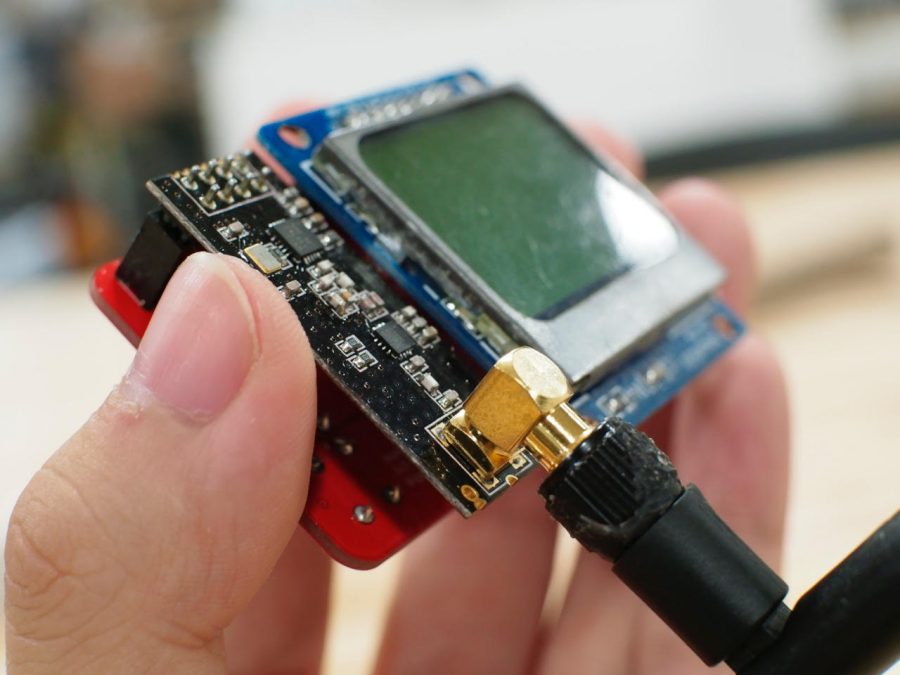University research team implements data collection system
The solar panel that is used to charge the WaggleNet Hive Sensor. WaggleNet is a sensor used to collect data about bee hives.
Oct 11, 2018
What began as a research project to collect data from beehives has expanded into a large-scale research project spread across multiple fields and colleges.
WaggleNet is a data collecting device. Its small size and universal connectivity allows it to be placed in any area such as a beehive, greenhouse or in a field.
WaggleNet was developed by Jimmy He, junior in Engineering. He said this device solves the loop feedback problem by automatically getting data online and sending it continuously.
“Anytime we have research come out from academia, it’s hard to actually have that implementation into people’s lives,” He said. “We aim to create this platform and target agriculture industries.”
WaggleNet has been deployed to campus labs such as the Pollinatarium and the Robinson lab.
Get The Daily Illini in your inbox!
The data collected by each of the devices goes directly to the University, where the WaggleNet team analyzes the data.
“We’re trying to make sense of it,” He said. “We’re feeding this data right back to the users so they will know the condition of their hives.”
Not only is WaggleNet collecting data, but it is also creating a network of audited devices. Much like the game telephone, the WaggleNet System allows users to create a network out of nowhere.
“The router connects to Wi-Fi and links all the devices together to create a self-created network,” He said. “These devices have three sockets and connect to solar panel and battery.”
This network allows for the devices to work in areas that are not connected to the internet.
“No one is going to deploy Wi-Fi over their field,” He said. “So, this network became useful for these kinds of situations.”
He said that each of the WaggleNet devices is 3D printed, which helps the team develop rapidly and make changes.
The data collected from WaggleNet has allowed the team to learn a lot more about the bees.
“Bees sound different all the time. At night, the frequency at which they buzz is different,” He said. “Now we are trying to do some focus research like being able to predict when the bees will swarm.”
Swarming is the process in which half the bees will leave the hive that they find inhabitable. He said that after the bees swarm, there might not be enough left to produce honey.
“We want to identify indicators of swarming, so we can send the beekeepers a text letting them know their bees are going to swarm, so they can get there and stop it,” he said.
The system is one that would be useful for the University beekeeping RSO, which has two hives at the Sustainable Student Farm.
Daniel Ferriss, sophomore in LAS, founded the RSO last year and said that a device in the hives would bring peace of mind.
“We keep our hives two miles away from campus,” Ferriss said. “I haven’t been to the hives for a week and a half. They could potentially be knocked over and I wouldn’t know.”
The University beekeeping RSO is working with WaggleNet at getting devices installed in the hives. Though there is no set date planned, Ferriss said he hopes it will get done before winter.
Senior lecturer and Chief Adviser in Engineering, Christopher Schmitz, has been the faculty adviser on the project.
As a beekeeper himself, Schmitz knew the urgent need of data from beehives.
“Beekeeping has always been a hobby and now we can take my experience to solve a problem,” Schmitz said. “Anyone could take their day-to-day job and apply it into your hobby.”
The project has progressed since its beginning last year and the goal for the project has shifted.
“The original goal was to monitor beehives anywhere in the world and do that under basically regular Wi-Fi,” Schmitz said. “The project system that they developed is much more versatile than that. It could be used for any data collection purposes.”
Since the launch of the project last year, the project and team have expanded rapidly.
“I am very much impressed with the fact that an undergraduate-led project could push a project forward so quickly and so completely,” Schmitz said. “I’m not surprised that we have this kind of talent.”






